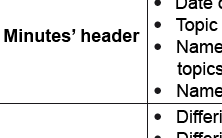|
|
Discussion
Discussions are an important part of your studies and come in various forms and techniques. Often there is room for a discussion after a presentation or speech; the audience can pose questions, add comments or criticism. Group discussions in seminars are essential to exchange information and opinions, or to review texts. In addition, a discussion with peers can be useful when searching for a new topic (e.g. when planning to write a master's thesis).
An objective is to exchange ideas, arguments, and knowledge.
A good, lively discussion has its advantages. It offers the possibility to look into new subjects while including new aspects and views. Established principles and convictions will be challenged and put into perspective while promoting tolerance towards dissidents. Comparing different views in an objective discussion may ideally result in realizing that dissidents can provide «legitimate» arguments as well. The claim to absolute truth can be settled. On the other hand, there are discussions that provide more clarity by showing generally understandable things from different angles. We especially recommend discussing problems since this will activate a potentially wide range of possible solutions as well as innovative and unconventional ideas (Schräder-Naef 1988: 57).
In order to promote a discussion's positive aspects, you have to create some necessary conditions first. All participants have to respect a few basic principles when having a discussion: polite manners, giving others a chance to speak without being interrupted, avoiding interjections and private conversations. All participants are equal, other opinions have to be respected, and all contributions should be paid equal attention. You should be critical but fair as regards all the arguments produced to avoid just reinforcing preconceptions. Arguments should be kept short in order not to wander from the subject.
Additionally, there are mandatory conditions as regards organization and equipment. Discussion groups should consist of five to ten people in the best of cases. Otherwise the range of contributions will be too small or too diverse («chatterbox» vs. «sleeper»). A good preparation is key, for participants as well as the moderator. All participants should know the topic after reading and working through the text to be discussed (marginalia, excerpts, etc.). A moderator has to be able to prevent deviations (not too many details or trivialities), stimulate a stalled discussion, and account for dissenting opinions. It is therefore necessary to have expert knowledge on the one hand and a sense of the situation on the other hand, as well as concrete ideas of how to direct a discussion's energy onto the right track while making it livelier.
When discussing a topic, there are sometimes problems, both individual and group specific. The intensity of participation will always be varying. A few will tend to monologize and prevent others from getting a word in edgewise; they use discussions as platforms for self-promotion. A discussion round often seems to be a battle field, where people not only try to convince others of their opinion but also aim at defeating opponents. Their motto is: «The last word wins». Such a verbal exchange may boost one's ego but will not result in any new findings since all participants are just forced to defend their positions more fiercely than planned.
Group-specific problems often manifest themselves by being afraid of one's own opinion. It is difficult to object to an opinion already accepted by the majority, even if that opinion is different from one's own. Additionally, a mutual consent on the inside can forward intoleration on the outside. A uniform group risks confirming all preconceptions instead of challenging them (Steiger 1994: 172).
Competent moderators always have discussions under control.
Moderators should support timid people in expressing their opinions.
Discussions aren't promoted by fights and verbal exchanges.
Minutes
Minutes are seen as a document (in written, photographic, acoustic, or filmic form). They reflect circumstances and preconditions as completely and transparently as possible and can therefore give information on statements, opinions, activities, etc. In general, minutes are process-driven (description of activities or a discussion). An exception is the results-oriented record of a discussion; such a record especially archives results (Rückriem, Stary & Franck 1989: 57–75). The following rules apply (cf. fig. 20):
- Do not give an account of the entire course of the discussion and avoid deviations and repetitions
- Do not repeat arguments literally; their contribution as regards the main problem is important. This means that the recorder has to understand the topic of the discussion and clarify continuously any intermediary results.
 Fig. 20: Structure of an elaborate discussion record. Source: Rückriem, Stary
& Franck (1989).
Fig. 20: Structure of an elaborate discussion record. Source: Rückriem, Stary
& Franck (1989).